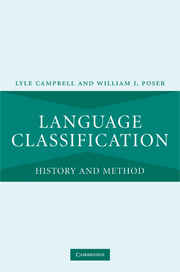Book contents
- Frontmatter
- Contents
- List of figures, tables, and charts
- Acknowledgments
- Preface
- 1 Introduction: how are languages shown to be related to one another?
- 2 The beginning of comparative linguistics
- 3 “Asiatic Jones, Oriental Jones”: Sir William Jones’ role in the raise of comparative linguistics
- 4 Consolidation of comparative linguistics
- 5 How some languages were shown to belong to Indo-European
- 6 Comparative linguistics of other language families and regions
- 7 How to show languages are related: the methods
- 8 The philosophical–psychological– typological–evolutionary approach to language relationships
- 9 Assessment of proposed distant genetic relationships
- 10 Beyond the comparative method?
- 11 Why and how do languages diversify and spread?
- 12 What can we learn about the earliest human language by comparing languages known today?
- 13 Conclusions: anticipating the future
- Appendix: Hypothesized distant genetic relationships
- References
- Index
3 - “Asiatic Jones, Oriental Jones”: Sir William Jones’ role in the raise of comparative linguistics
Published online by Cambridge University Press: 22 September 2009
- Frontmatter
- Contents
- List of figures, tables, and charts
- Acknowledgments
- Preface
- 1 Introduction: how are languages shown to be related to one another?
- 2 The beginning of comparative linguistics
- 3 “Asiatic Jones, Oriental Jones”: Sir William Jones’ role in the raise of comparative linguistics
- 4 Consolidation of comparative linguistics
- 5 How some languages were shown to belong to Indo-European
- 6 Comparative linguistics of other language families and regions
- 7 How to show languages are related: the methods
- 8 The philosophical–psychological– typological–evolutionary approach to language relationships
- 9 Assessment of proposed distant genetic relationships
- 10 Beyond the comparative method?
- 11 Why and how do languages diversify and spread?
- 12 What can we learn about the earliest human language by comparing languages known today?
- 13 Conclusions: anticipating the future
- Appendix: Hypothesized distant genetic relationships
- References
- Index
Summary
Others affirm that in the tower [of Babel] there were only nine materials, and that these were clay and water, wool and blood, wood and lime, pitch, linen, and bitumen … These represent noun, pronoun, verb, adverb, participle, conjunction, preposition, interjection.
(Auracepit na n-Éces, Irish grammarians; cited in Eco 1995:16)Introduction
We come now to Sir William Jones (1746–94), to whom so much credit for developments in historical linguistics has been given. Jones’ (1786[1789]) famous “philologer” passage – that most momentous soundbite of yore – declared a relationship between Sanskrit and several other Indo-European languages, and is often cited as the beginning of Indo-European and of comparative-historical linguistics. Nearly all introductory textbooks on historical linguistics repeat this claim, as do linguistic publications generally. On all sides we see statements such as Bengtson and Ruhlen's (1997:3) that Sir William Jones “discovered the method of comparative linguistics – and with it the Indo-European family,” and Michalove et al.'s (1998:452) that “it was Sir William Jones’ famous statement in 1786 that not only led to the recognition of Indo-European … but also put linguistic taxonomy on a solid foundation for the first time.” Emeneau (2000:545) called Jones’ announcement in the philologer passage “that prime event in the linguistics of India and the Indo-European linguistic world.” Gray (1999:116–17) speaking of Jones’ “earth-shattering discovery,” asserts that “Jones used careful etymological analysis to demonstrate that [here the philologer passage is repeated] … The significance of this statement cannot be overestimated.
- Type
- Chapter
- Information
- Language ClassificationHistory and Method, pp. 32 - 47Publisher: Cambridge University PressPrint publication year: 2008



